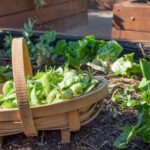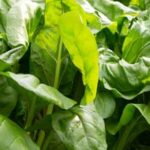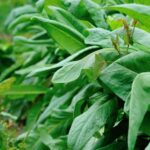Introduction
Using neem oil in vegetable gardens is a fantastic way to provide natural protection against pests and fungus. Neem oil is obtained from the fruit and seed kernels of the tropical neem tree, and its active ingredient is azadirachtin. The compound helps to repel, inhibit the growth of, or even kill harmful insects, fungi, and bacteria like aphids, whiteflies, powdery mildew and more. Additionally, it can naturally reduce damage from other plant-consuming insects like caterpillars and beetles. By introducing neem oil into your garden you will encourage healthier plants that are better able to resist disease and pests while increasing yields.
Benefits:
The main benefit of using neem oil in a vegetable garden is the ability to naturally deter pests without relying on synthetic insecticides or fertilizers. It works as an effective insecticide by disrupting their hormonal systems so they can no longer reproduce or feed properly. As an added bonus, neem oil doesn’t affect beneficial insects like bees, making it safer for honey bee colonies than some other pesticides. It also acts as a fungicide by killing molds and fungal diseases that could otherwise destroy crops very quickly. Applying accurately timed doses of neem oil also has been found to increase crop yield significantly through improved pollination activity.
How To Use Neem Oil:
1) Prepare a diluted work solution using 1 teaspoon (5ml) of neem concentrate per gallon (3.8 liters) of water and stir thoroughly until dissolved completely;
2) Apply either with a pressurized sprayer or handheld pump sprayer on the foliage in mid-morning when temperatures have begun rising;
3) If any pests are still present after professional application then repeat every 5-7 days until they disappear;
4) Avoid applying directly to blossoms if possible as this may increase blossom drop which would decrease yield significantly;
5) Take safety precautions when working with neem oil such as wearing gloves – clothing that covers nearly your entire body – goggles -and mask for breathing;
Finally, always read all directions carefully before beginning any treatment with neem oil! This product should be used as directed only in accordance with all local codes as misuse can be hazardous for both plants and humans alike!
Understanding Neem Oil
Neem oil is a naturally occurring substance derived from the leaves and seeds of the neem tree, found primarily in India. It has been used as a natural pesticide for centuries, as it contains certain compounds that are toxic to many pests common to vegetable gardens. It works by disrupting the growth cycle of insect larvae, causing them to stop feeding so they die before they do any damage.
Using Neem Oil on Your Vegetable Garden:
Before using neem oil on your garden, it’s important to identify which insect threats your vegetables may be facing. Common pests like aphids, leafhoppers, and mites can all be controlled with neem oil but calling attention to the specific infestations can save time and money down the road. After identifying the pests, check your garden for any signs of damage such as missing leaves or wilting stems. Next, mix your neem oil solution following manufacturer instructions until you have a mixture that is around 70-90% neem oil and 10-30% water. Shake this solution in a spray bottle and reapply two or three times per week directly onto both sides of leaves and stems until you have eliminated all traces of insects.
An additional way to protect your garden is by broadcasting an application of neem granules (a powder made from ground up neem seeds) over areas where it’s difficult to access with a spray bottle such as in open flower beds where beneficial insects like ladybugs live. This option isn’t always available since some localities prohibit broad applications of pesticides due to their potentially harmful effects on wildlife or runoff into nearby water sources. Be sure to check with your local ordinances before broadcasting any sort of pesticide on your property.
Preparing the Garden
When using neem oil on your vegetable garden, it is important to first prepare the garden. This will help ensure that your plants thrive after applying the oil and that you do not damage or harm them in any way by using it. When preparing your garden for using neem oil, there are a few key tips to keep in mind.
The most important tip is to maintain proper soil health. If you are growing vegetables in unprepared soil, it’s highly recommended that you till the soil in order to break up any existing compaction and mix in compost or other organic matter for nutrient enrichment and protection against potential pest infestations. Additionally, be sure to keep weeds under control before applying neem oil as they can significantly reduce yields from vegetables and make future pest issues worse.
Another important factor when considering neem oil use is crop rotation practices. Rotating crops helps break pest cycles from one season of gardening to the next and reduces losses due to pests and diseases throughout your vegetable garden year after year. Be sure to properly rotate your crops every spring when planting for best success with both crop health and yield over time.
Finally, savvy gardeners know that keeping records of various planting locations throughout all seasons of the year can verify specific patterns, pests, and disease prevention that may reveal certain best practices such as companion planting of certain kinds of plants or knowledge on how little supplemental watering may be necessary during dry spells while still maintaining sufficient availability of resources for strong plant growth overall. Familiarizing yourself with basic tricks like this can help establish good habits when gardening before ever having to use neem oil as a remedy for insidious infestations.
Application Methods
There are a few different application methods for using neem oil on your vegetable garden. One common method is to mix one tablespoon of neem oil into one gallon of water. Or, you can mix together 2 teaspoons of insecticidal soap with 1 cup of neem oil and 1 gallon of water. Make sure to stir or shake the mixture thoroughly before use and apply it directly to plants. If you are using a ready-mixed product, use according to the manufacturer’s directions as well.
Be careful not to overapply as too much neem oil can be harmful to your plants. Additionally, it is best if you wait until after any expected rainfalls before applying this solution in order for it to ensure that the protective film of oil remains on the leaves longer. Some experts recommend waiting about seven days after applying before harvesting vegetables, although others suggest that the harvest can occur soon after application.
When deciding which area of your garden needs Neem oil, consider where pests may be found most often and inspect those areas regularly for signs of infestation. Areas around windows and doors, low-hanging trees, deep crevices in walls, underneath plant foliage and in shady corners are generally favorable breeding spots for pests. Applying Neem oil in these areas helps deter pests from reproducing while also limiting damage they cause to plants. Fruits trees, gardens containing edibles or plants susceptible to root rot should also receive special treatment with Neem oil whenever possible in order to keep them safe from damage due destruction by pests or infected soil conditions.
How to Maximize Results
Pro Tips for Maximizing Results When Using Neem Oil:
1. Always read and follow the instructions on the product label to make sure you are using it safely and correctly.
2. Be sure your vegetable garden is well-watered before applying neem oil. This will help the oil spread more evenly and penetrate deep into the soil where pests may be hiding.
3. Try to apply neem oil in the late afternoon when temperatures are cooler since it can break down with heat, making it less effective at control pests. Avoid applying during sunny, hot days as well as during periods of heavy or constant rain, or excess wind which can blow away product particles before they have a chance to work effectively.
4. To really maximize pest control benefits from neem oil, try alternating applications with other organic insecticide such as spinosad, Bacillus thuringiensis (Bt) or diatomaceous earth (DE). These organic pesticides provide different modes of action that can help reduce toxicity levels found in the soil from over application of any one pesticide type.
5. Make sure to respray every 7-10 days after initial post until you no longer see tent caterpillar damage present on your vegetables or you don’t observe any adults around your plants anymore—this could take up to a few weeks depending on reapplication frequency and temperature conditions in your area.
How Long Does Neem Oil Last In The Garden?
Neem oil will typically last 4-8 weeks when used in an outdoor setting like a vegetable garden; this time duration can vary so make sure you keep re-applying neem oil every 7-10 days while insects are present in order to improve effectiveness long-term and reach optimal pest control results faster!
Common Questions
FAQs
Q: What is neem oil?
A: Neem oil is a natural product made from the extracts of an evergreen tree native to India and Southeast Asia. It can be used as a fungicide, insecticide, and nematicide.
Q: How do I use neem oil on my vegetable garden?
A: You should apply neem oil to your vegetable garden when temperatures are below 90°F. Spray your vegetables with a premixed solution of 1 tablespoon of organic neem oil per gallon of water. Make sure there is no excess water around the plants and try to spray under the leaves to reach pests hiding beneath them. If needed, it’s recommended to apply the solution twice – first three weeks after planting and then again five weeks later. After treatment, you will see an improvement within 3-5 days!
Risks Of Over-Applying Neem Oil
It’s important to note that neem oil should not be applied in high concentrations as it can damage delicate plants or repel pollinating insects like bees or butterflies. Also, too much application can reduce root growth and soil fertility due to its toxic action against fungi and bacteria that help in nutrient cycling in the soil. Therefore, it is important to read instructions carefully before using neem oil on your vegetable garden and ensure that you are following all safety guidelines properly.
Conclusion
Neem oil is a natural pest control product that can be used to effectively get rid of pests and potential diseases such as aphids, caterpillars, whiteflies, spider mites, and nematodes in your vegetable garden. It’s also non-toxic to beneficial insects like bees and ladybugs.
Using neem oil in your vegetable garden is a great way to promote growth and reduce any potential damage done by harmful pests or diseases without needing to resort to harsh chemicals or toxic pesticides. Neem oil is made from the fruit and seed of a tropical evergreen tree known as Neem (Azadirachta indica). It works by disrupting the development cycle of many common garden pests, preventing them from reproducing. Due to its environmental benefits, more people are turning to it as an alternative for natural pest control in their gardens.
To get started with neem oil for your vegetable garden you’ll need an organic-approved neem oil spray concentrate mixed with water per package instructions. Make sure you’re spraying in temperatures below 85°F (29°C) and on cloudy days for best results. Apply the spray directly onto affected plants or areas where you know there may be infestations from pests or diseases. Reapply this solution every 5-7 days—depending on severity—to ensure long-term success against the problem.
Using neem oil helps keep the vegetables you grow safe not only for yourselves but also for everyone who consumes them. Additionally, its ability to annihilate pesky pests without harming helpful insects makes it a handy tool when trying to create a balanced eco-system in your own little garden plot!

If you’re looking to get into vegetable gardening, or are just looking for some tips on how to make your current garden better, then you’ve come to the right place! My name is Ethel and I have been gardening for years. In this blog, I’m going to share with you some of my best tips on how to create a successful vegetable garden.





